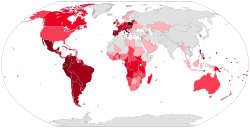
The Gilbert and Ellice Islands in the Pacific Ocean were part of the British Empire from 1892 to 1976. They were a protectorate from 1892 to 12 January 1916, and then a colony until 1 January 1976, and were administered as part of the British Western Pacific Territories (BWPT) until they became independent. The history of GEIC was mainly characterized by phosphate mining on Ocean Island. In October 1975, these islands were divided by force of law into two separate colonies, and they became independent nations shortly thereafter: the Ellice Islands became Tuvalu in 1978, and the Gilbert Islands became part of Kiribati in 1979.
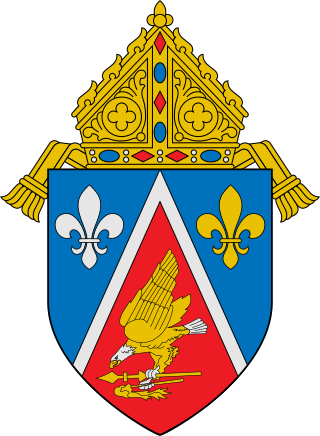
The Diocese of Samoa–Pago Pago is a Latin Church suffragan diocese of the Roman Catholic Church in the United States overseas dependency of American Samoa, in the ecclesiastical province of the Metropolitan Roman Catholic Archdiocese of Samoa–Apia.
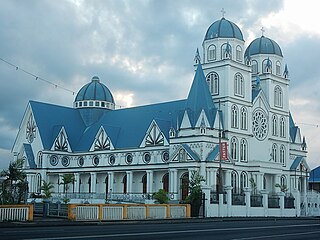
The Roman Catholic Archdiocese of Samoa-Apia consists of the Independent State of Samoa.
In the canon law of the Catholic Church, a mission sui iuris, also known as an independent mission, can be defined as: "an ecclesial structure erected from a previous territory, with explicit boundaries, under the care of a religious community or other diocese, responding to a missionary exigency and headed by a superior nominated by the Holy See, under the aegis of the Congregation for the Evangelization of Peoples."
The Congregational Christian Church of Tuvalu, commonly the Church of Tuvalu, is a Christian church which is the state church of Tuvalu, although this status merely entitles it to "the privilege of performing special services on major national events"; its adherents comprise about 86% of the 11,600 inhabitants of the archipelago.

The Roman Catholic Archdiocese of Suva is a Metropolitan Archdiocese in Fiji. It is responsible for the suffragan dioceses of Rarotonga and Tarawa and Nauru and —as of 21 March 2003—the Mission Sui Iuris of Funafuti. The archdiocese was created in 1966, to succeed the Apostolic Vicariate of Fiji.
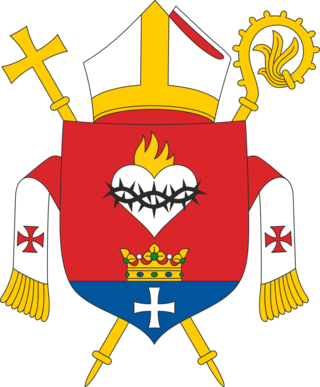
The Roman CatholicDiocese of Tarawa and Nauru in Kiribati and Nauru is a suffragan diocese of the Archdiocese of Suva. It was erected as the Vicariate Apostolic of Gilbert Islands in 1897, with see in Tanaeang from 1936 to the end of 1950s, and later elevated to as the Diocese of Tarawa in 1966. There was a name change in 1978 and, in 1982, the diocese was split from the Mission sui iuris of Funafuti. The diocese currently has jurisdiction over all of Kiribati and Nauru.

The Roman Catholic Mission Sui Iuris of Tokelau in Tokelau is a suffragan mission of the Roman Catholic Archdiocese of Samoa-Apia. It was formed in 1992 when the Archdiocese of Samoa-Apia and Tokelau was split into the Archdiocese of Samoa-Apia and the Mission Sui Iuris of Tokelau. The position of Ecclesiastical Superior is currently vacant following the death of Archbishop Alapati Lui Mata’eliga on 25 April 2023.

Christianity is the predominant religion in Kiribati, with Catholicism being its largest denomination.

The Catholic Church in Nauru is part of the worldwide Catholic Church, which, inspired by the life, death and teachings of Jesus Christ, and under the spiritual leadership of the Pope and Roman curia in the Vatican City is the largest Christian church in the world.

The Catholic Church in Kiribati is part of the worldwide Catholic Church, which, inspired by the life, death and teachings of Jesus Christ, and under the spiritual leadership of the Pope and Roman curia in the Vatican City is the largest Christian church in the world. Koru Tito is Bishop of Tarawa and Nauru, with see in Kiribati.
The Episcopal Conference of the Pacific (CEPAC) is the episcopal conference of the Catholic Church that includes the bishops of several islands in Oceania. The CEPAC is a member of the Federation of Catholic Bishops' Conferences of Oceania, FCBCO.
The Teone Church also alternatively known as the Catholic Church of Teone or the Catholic Centre of Teone, is a religious building in Vaiaku on the south coast of Fongafale in the atoll of Funafuti, which is the economic center of Tuvalu in Oceania.

The Japanese occupation of the Gilbert Islands was the period in the history of Kiribati between 1941 and 1945 when Imperial Japanese forces occupied the Gilbert Islands during World War II, in the Pacific War theatre.

Naval Base Funafuti was a naval base built by the United States Navy in 1942 to support the World War II effort. The base was located on the Island of Funafuti of the Ellice Islands in the Western Pacific Ocean. The island is now Tuvalu, an island country in the Polynesian. After the surprise attack on Naval Station Pearl Harbor on December 7, 1941, the US Navy was in need of setting up more advance bases in the Pacific Ocean. At Naval Base Funafuti the Navy built a sea port, a small hospital, PT boat base, a seaplane base and an airbase. The United States Marine Corps landed on Funafuti on 2 October 1942 and on Nanumea and Nukufetau in August 1943. The Japanese had already occupied Tarawa and other islands in what is now Kiribati, but were delayed by the losses at the Battle of the Coral Sea.
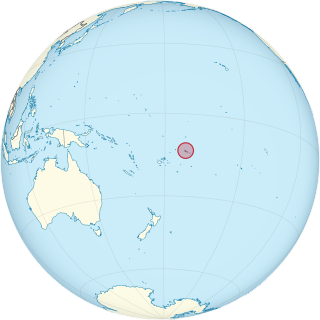
Naval Base Samoa, codename Operation Straw, was a number of United States Navy bases at American Samoa in the central Pacific Ocean. The bases were used during World War II to support the island hopping Pacific war efforts of the allied nations fighting the Empire of Japan.
